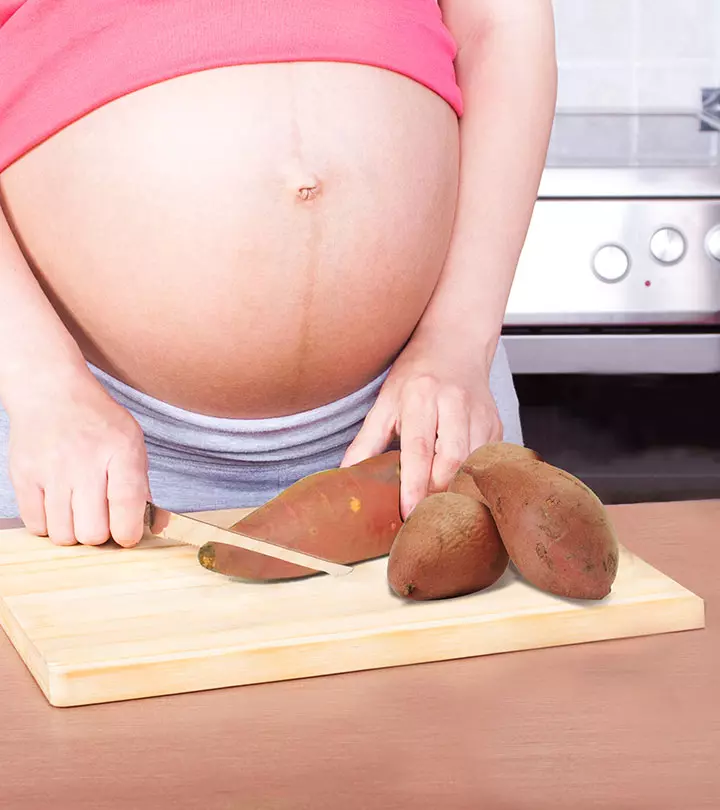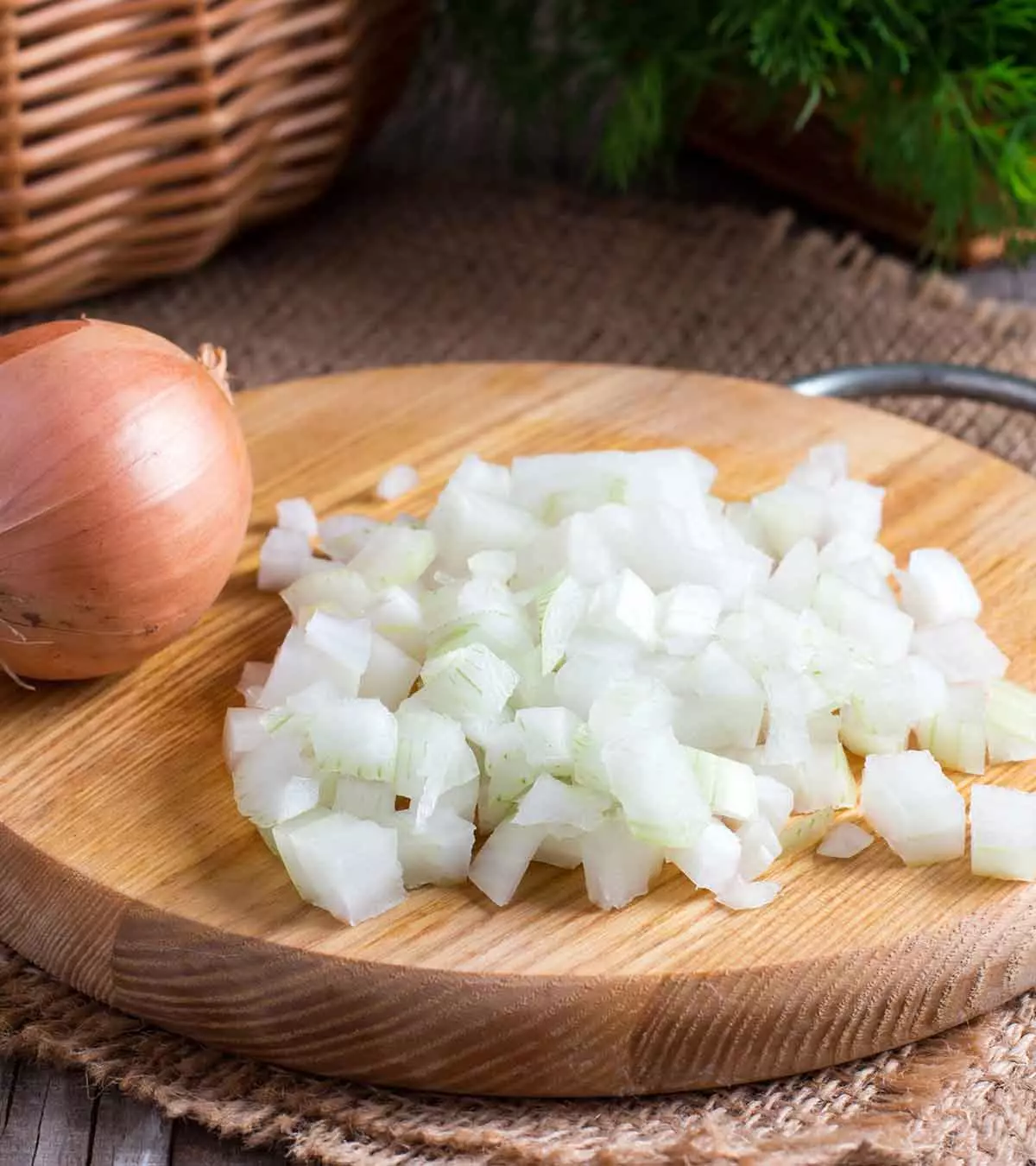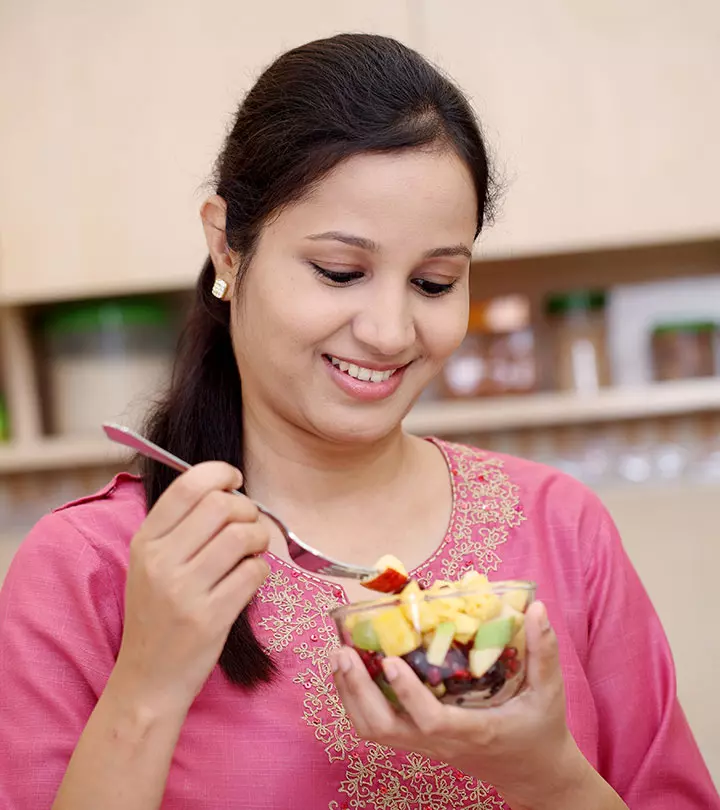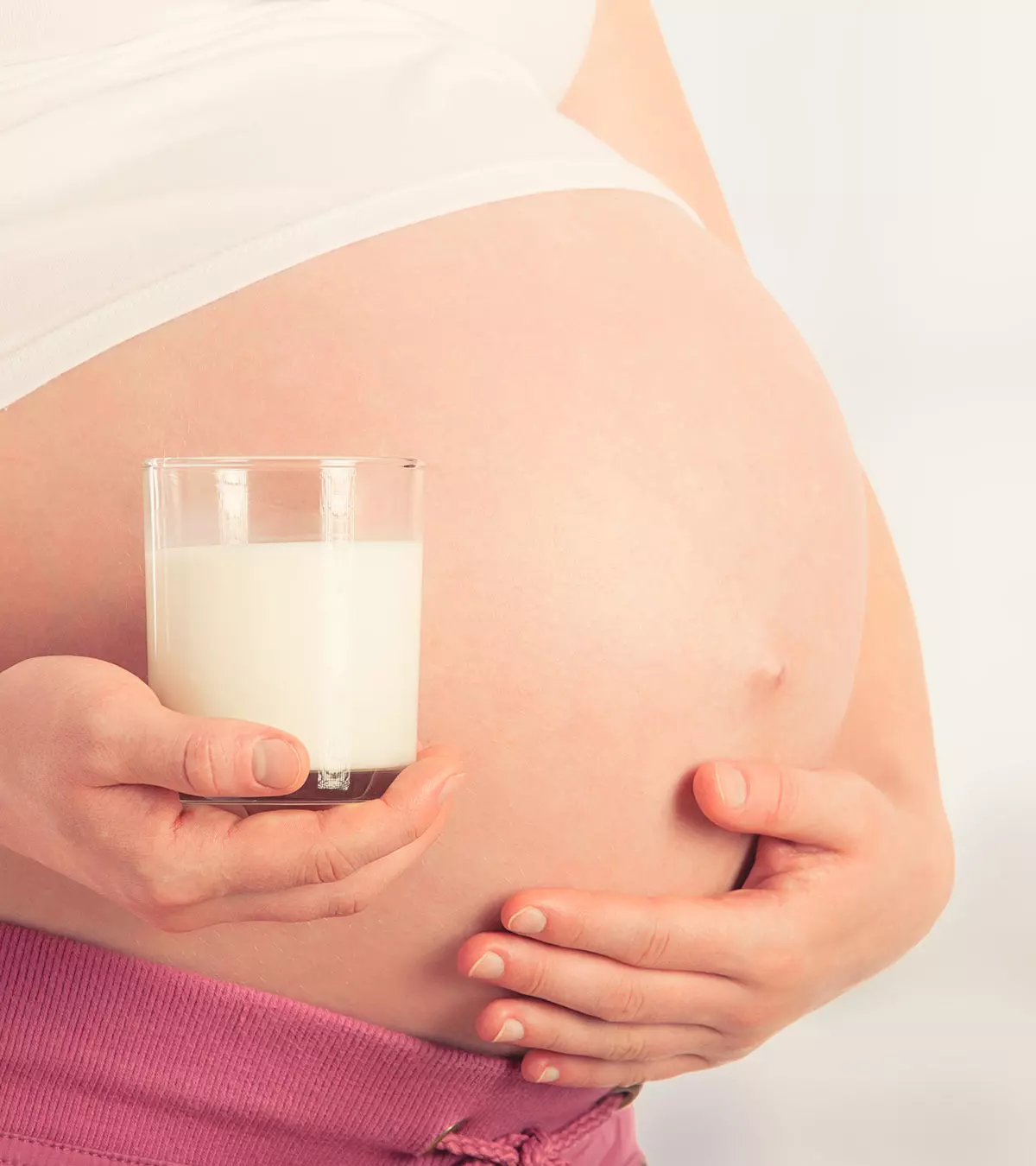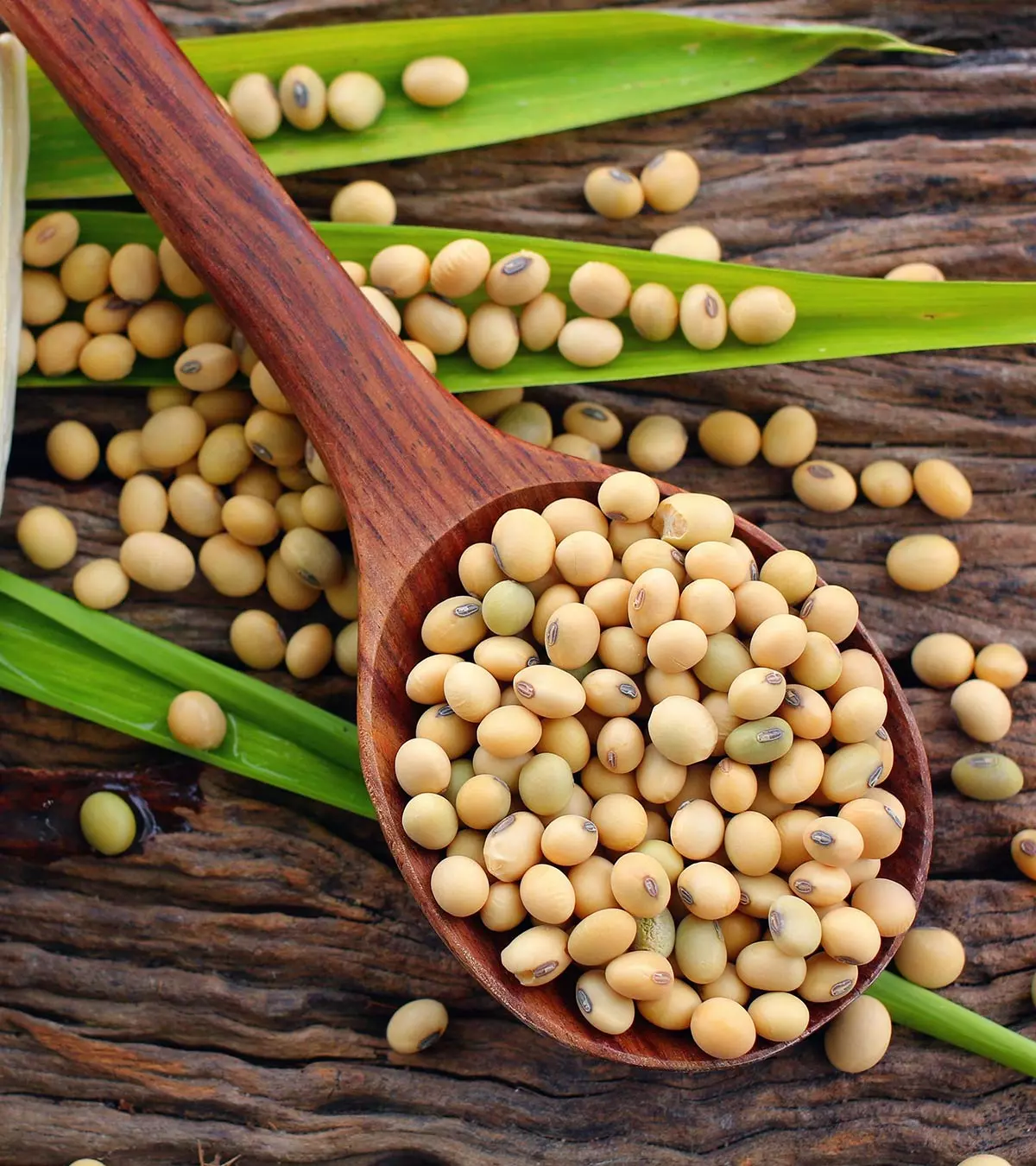
Image: Shutterstock
Sour cream in pregnancy may be safe, provided it is prepared by pasteurizing, homogenizing, and ripening a light cream. The ripening process uses a culture of lactic acid bacteria and other flavoring substances to give the sour cream a mild and pleasant acidic taste (1). Sour cream is often used as a condiment to enhance flavor in various savory meals, such as potatoes, salads, smoked salmon, and in baked goods, such as bread, cakes, and cookies (1) (2).
Keep reading to learn about the benefits of sour cream, their safety for expecting mothers, and the precautions to take before consuming sour cream.
Key Pointers
- Sour cream is safe to consume during pregnancy provided it is pasteurized and produced by a reliable supplier.
- It is rich in calcium and protein and might benefit the mother and the growing fetus.
- Consuming excessive sour cream can lead to weight gain and increased cholesterol levels.
- Purchase freshly made sour cream and store it at an appropriate temperature to make it safe to consume and prevent the risk of any infection.
Is Sour Cream Safe During Pregnancy?
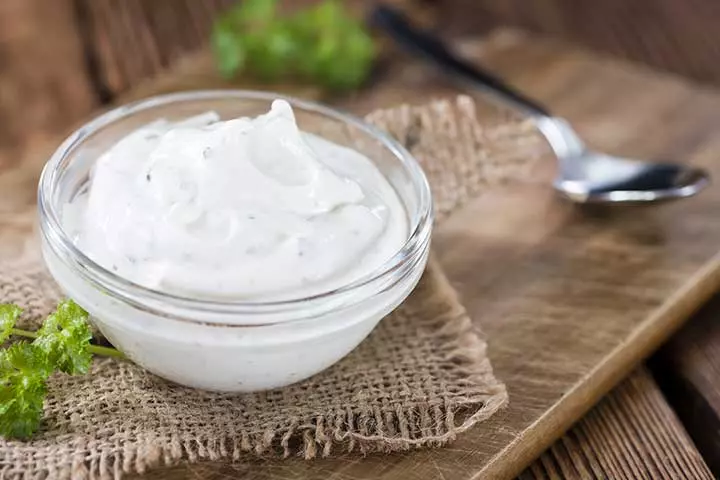
Sour cream and some dairy products are safe during pregnancy, provided they are pasteurized and come from a trustworthy supplier. The pasteurization procedure uses heat to destroy disease-causing microorganisms, thereby preventing food poisoning (3).
However, avoid consuming homemade sour cream, as it may not be as safe as commercially available products. The probability of unwanted, toxic bacteria growing in homemade sour cream is higher since factors like temperature, hygiene, and bacterial levels are considerably tricky to evaluate and regulate at home (4).
Consuming pasteurized dairy products during pregnancy is crucial for protecting the mother and the developing fetus from several infections and illnesses.
Nutritional Information Of Sour Cream
Since sour cream is frequently used as a condiment in small amounts, its nutritional benefits might not be significant
. However, here is a quick description of nutrients available in one tablespoon (12g) of sour cream (5).
| Nutrient | Amount |
| Energy | 23.8Kcal |
| Protein | 0.293g |
| Total lipid (fat) | 2.33g |
| Carbohydrate | 0.556g |
| Lactose | 0.409g |
| Calcium | 12.1mg |
| Phosphorus | 9.12mg |
| Sodium | 3.72mg |
| Folate | 0.72µg |
| Potassium | 15mg |
| Cholesterol | 7.08mg |
Source: US Food Data Central and Dietary Guidelines For Americans 2020-2025
Different Types Of Sour Cream
Sour cream is also called ”cultured cream”, ”cultured sour cream” and ”salad cream” (1). Various kinds are available in the market, classified into two broad types (6).
- Cultured sour cream: Made by combining lactic acid bacteria, flavoring compounds, and milk compounds
- Acidified sour cream: Made by directly adding food-grade acids (such as vinegar or lime juice) with or without enzymes (such as renin) or other lactic acid-producing bacteria to the milk mixture.
 Quick tip
Quick tipHealth Benefits Of Consuming Sour Cream During Pregnancy
Sour cream is a component of dairy foods, and because of its high calcium and vitamin content, it may have significant health benefits during pregnancy.
However, most of the claimed health benefits of sour cream are based on studies on regular dairy consumption and not specifically on sour cream. Read on to learn about the possible benefits of including sour cream to your nutrition plan.
- Helps maintain bone health: Sour cream is a good source of calcium for the fetus’s developing bones. Lack of calcium during pregnancy increases the mother’s risk of having a poor bone mass and osteoporosisiA condition that weakens bones, increasing the chance of sudden, unsuspected bone fractures in the future (7).
- May regulate blood pressure: Increased calcium consumption has been found to regulate blood pressure significantly and thereby can reduce the risk of pre-eclampsia leading to preterm birthiWhen a baby is delivered before the gestational age of 37 weeks (8).
- Supports fetal growth: The protein in dairy products may help contribute to optimal fetal development and necessary weight gain throughout the pregnancy (9)(10).
Possible Side Effects Of Sour Cream During Pregnancy
Excessive consumption of sour cream presents some possible risks. Here are some of the risk factors (3).
- Listeria bacteria in all unpasteurized dairy products, including sour cream, can lead to a severe infection called listeriosis. According to the World Health Organization (WHO), pregnant women face approximately 20 times greater susceptibility to contracting listeriosis than healthy adults. The infection has the potential to cause still birthiWhen a fetus passes away in the uterus or is born dead after 20 weeks of pregnancy. and miscarriage.
- Dairy products contain a significant amount of saturated fat, and excessive consumption can result in problems, such as pregnancy weight gain, high cholesterol resulting in an increased risk of heart disease.
- All dairy products, including sour cream, contain a sugar called lactose. The inability to digest this sugar can cause lactose intolerance, with symptoms including bloating and diarrhea.
 Quick fact
Quick factHow To Include Sour Cream When Pregnant
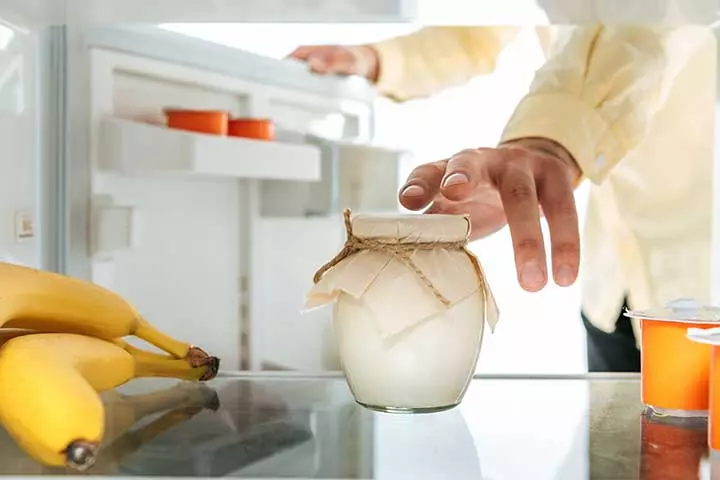
Although there are no known risks of eating pasteurized sour cream, it is better to remain cautious. You may consider the following points before buying sour cream:
- Always check for “pasteurized” labels while buying any dairy goods, including sour cream, from a local shop or a supermarket.
- Pay attention to the expiration date on the label, and eat the sour cream within that time.
- Consider buying sour cream dip with the most recent manufacture and packing dates. It’s a reliable way to ensure the product is safe and fresh.
- Keep the sour cream refrigerated at 40℉ or lower until it is time to consume it, as refrigeration minimizes bacterial growth (12).
- Avoid eating sour creams served at restaurants because they may not be pasteurized or contain unpasteurized milk products and are unsafe during pregnancy.
Delicious Sour Cream Recipes To Try When Pregnant
Let’s look at some pregnancy-friendly sour cream recipes you can try preparing at home to satiate your cravings.
Note: Use pasteurized sour cream for all the recipes
1. Sour cream and onion pasta
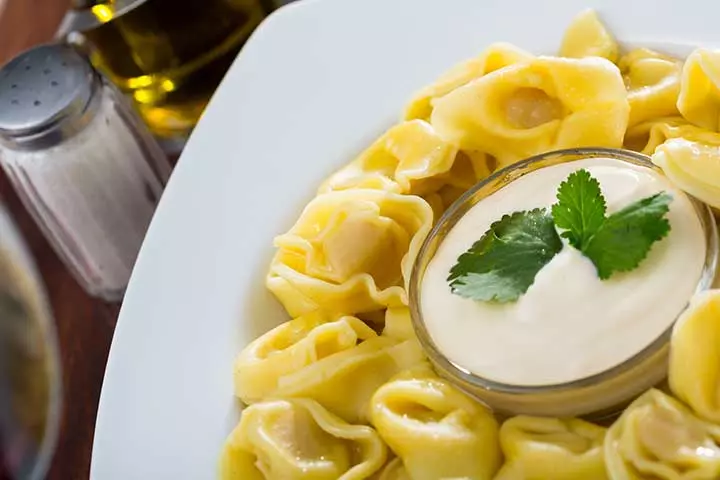
You will need
- 5oz pasta
- ½ cup sour cream
- ½ cup milk
- ¼ cup freshly chopped chives
- 1tbsp flour
- 5tbsp butter
- Salt and pepper
How to do
- Boil pasta in a big pot of salted water until it is tender but not chewy.
- Take a saucepan and melt the butter. Sprinkle the flour and cook over medium heat for two to three minutes.
- Add milk gradually while stirring, increase the heat to medium, and continue to whisk until the sauce boils, is lump-free, and is thick.
- Once thick, remove the pan from the heat, then whisk in the sour cream until everything is combined.
- Transfer the cooked pasta with a slotted spoon into the sauce. Cover the pasta with the sauce.
- Add the freshly chopped chives, salt, and pepper. Enjoy it hot.
2. Chicken stew with creamy potatoes and radish

You will need
- 4 chicken legs
- 1 chopped onion
- 5 sliced garlic cloves
- 1 can peeled tomatoes
- 1½lb baby potatoes
- ½ slice lemon
- 6 sliced radishes
- 3 cups chicken stock
- 2tbsp olive oil
- 2tbsp paprika
- ¾ cup sour cream
- Kosher salt
How to do
- Season the chicken with salt. In a big pot, heat the oil and fry the chicken until it is golden brown. Transfer the cooked chicken to another plate.
- In the same pot, cook onion until it is softened, and add garlic and paprika.
- Add peeled tomatoes and smash till no large pieces are left. Bring it to a simmer and cook till thickened. Add broth, potatoes, and chicken, and let it cook.
- Reduce the heat to medium-low and add broth if required. Cook until the chicken is tender and potatoes turn creamy.
- Add lemon juice, sour cream, and salt in a bowl. In another bowl, add radishes and sprinkle them with some salt.
- Drizzle sour cream over the stew and add the radishes. Give it a good stir and serve.
 Quick tip
Quick tip3. Sour cream cookies

You will need
- 1 cup unsalted butter
- 1 cup sour cream
- 1¾ cup sugar
- 2 eggs
- 1tbsp vanilla
- 3½ cup all-purpose flour
- 1tbsp baking soda
- 1tbsp baking powder
- ½tbsp salt
How to do
- In a large bowl, combine butter and sugar and mix until the mixture is creamy.
- Add vanilla, eggs, and sour cream to the above mixture and mix all the ingredients together.
- Add flour, baking soda, and baking powder and beat until all the dry ingredients are well combined.
- A soft dough will be formed. Refrigerate this dough overnight.
- Make small cookie balls by rolling them between the palms of your hand and arranging them on a baking sheet. Preheat the oven to 350 degrees.
- Bake the cookies for 11-12 minutes until the edges turn lightly golden.
- Let the cookies cool completely before serving.
4. Sour cream pancakes

You will need:
- 3 cups all-purpose flour
- 1 ½ cups sour cream
- 2tbsp granulated sugar
- 6tbsp melted butter
- 1 ½ cups of milk
- 1 ½tsp baking powder
- 1/2tsp salt
- ¾tsp baking soda
- 3 eggs
How to:
- Mix flour, sugar, baking powder, and baking soda in a large bowl. In another bowl, combine eggs, butter, sour cream and milk.
- Pour all the wet ingredients into the dry ingredients bowl and mix till just well combined. Let the batter rest for some time.
- Preheat a griddle for one to two minutes on medium heat.
- Pour the batter onto the griddle and cook until small bubbles appear on the surface of the pancake.
- Flip the pancake and cook until it’s light golden brown in color. Serve warm.
Frequently Asked Questions
1. How much sour cream can I safely eat during pregnancy?
The American Pregnancy Association recommends pregnant women can consume about four servings of dairy products and 1000mg of calcium daily. Sour cream is rich in calcium. However, balance and moderation are the keys to eating sour cream during pregnancy. You may also include other calcium-rich foods such as green leafy vegetables, beans, seafood, and milk during pregnancy (13).
2. Are all sour creams pasteurized?
Commercial versions of sour cream sold in local stores are usually pasteurized. You should check labels on the product or enquire about it before consuming it for maximum safety.
3. Can sour cream trigger any pregnancy-related symptoms like heartburn?
Full-fat sour cream may cause pregnancy-related symptoms such as heartburn in sensitive individuals. Heartburn is a common symptom in pregnant women due to hormonal changes, which can relax the muscle between the stomach and esophagus, allowing stomach acid to flow back up into the esophagus (14).
4. Can pregnant women consume sour cream-based dips and dressings?
Pregnant women can consume sour cream-based dips and dressings, provided they are pasteurized and properly stored. Check the labels carefully to ensure product safety.
5. Should I avoid sour cream if I have gestational diabetes?
Sour cream, like other dairy products, contains carbohydrates. Therefore, paying attention to your meals’ portion size and overall carbohydrate content is essential. If you suspect regular sour cream is affecting your sugar levels, you may try its low-fat or reduced-fat alternatives after consulting a nutrition expert.
Sour cream consumption during pregnancy is generally safe when taken in moderation. This refreshing cream benefits the health of your gut, heart, and bones. Using sour cream when pregnant is risk-free if you follow the safety advice and keep the risk factors in mind. You can also use sour creams to make delicious recipes, dips, or simply toppings.
Infographic: Sour Cream Recipes To Try During Pregnancy
Sour creams are often limited to dips and garnishing. Adding sour creams to recipes makes them more flavorful and refreshing. Check this infographic in which we bring six unique ways to include sour cream in your dishes. Illustration: Momjunction Design Team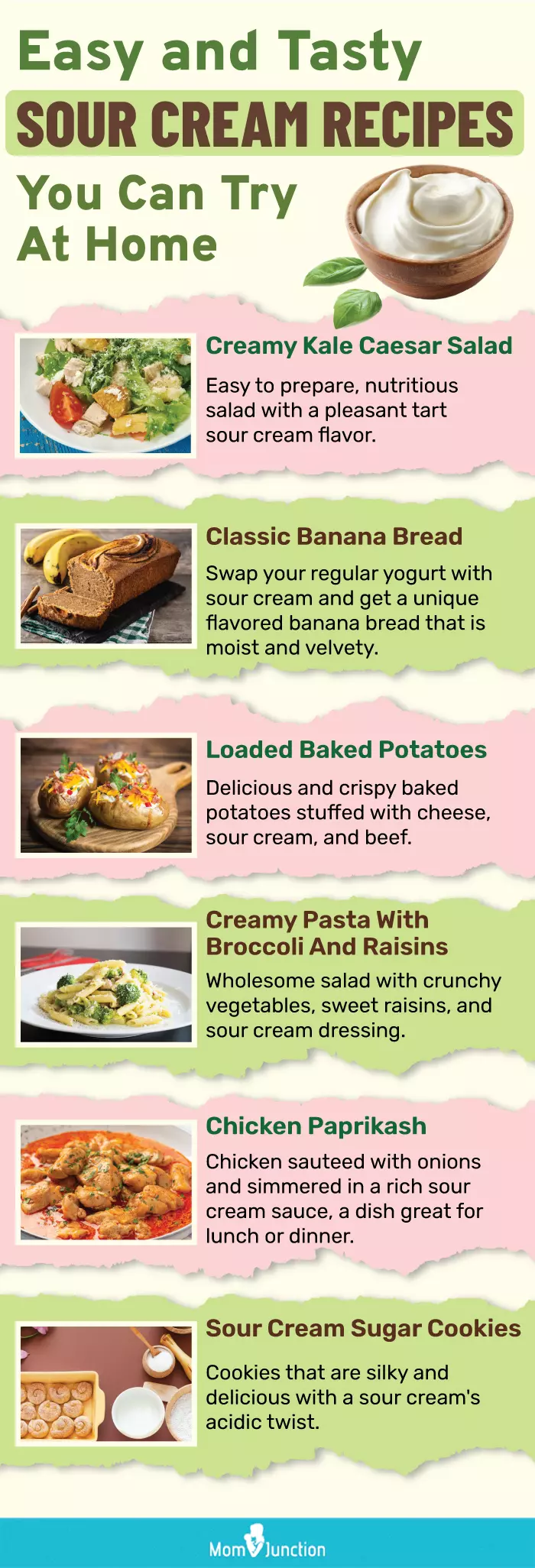
Illustration: Sour Cream In Pregnancy: Safety Benefits And Side Effects

Image: Dall·E/MomJunction Design Team
References
- D Katke et al; (2019); Standardization and Quality Evaluation of Sour Cream Enriched Therapeutic Food Products.
https://www.ijcmas.com/8-3-2019/S.D.%20Katke,%20et%20al.pdf - The Secrets Of Sour Cream.
https://extension.illinois.edu/blogs/simply-nutritious-quick-and-delicious/2019-11-27-secrets-sour-cream - Dairy And Alternatives In Your Diet.
https://www.nhs.uk/live-well/eat-well/food-types/milk-and-dairy-nutrition/ - Suggestions For Making Safe Fermented At Home.
https://isappscience.org/suggestions-making-safe-fermented-foods-home/ - Cream Sour Cultured.
https://fdc.nal.usda.gov/fdc-app.html#/food-details/171257/nutrients - Lester Hankin et al; (1981); Quality Of Sour Cream And Non-Butterfat Sour Dressing.
https://portal.ct.gov/-/media/caes/documents/publications/bulletins/b795pdf.pdf - Ashok Kumar et al;(2017); Calcium: A Nutrient In Pregnancy.
https://www.ncbi.nlm.nih.gov/pmc/articles/PMC5561751/ - G Justus Hofmeyr et al;(2014); Calcium Supplementation During Pregnancy For Preventing Hypertensive Disorders And Related Problems.
https://pubmed.ncbi.nlm.nih.gov/24960615/ - The Importance Of Low Fat Dairy Consumption During Pregnancy.
https://www.wm.edu/as/programs/healthy_beginnings/files/healthy_beginnings_originals/the_importance_of_%20low_fat_dairy_consumption_pamphlet_final.pdf - Fatemah Borazjani et al; (2013); Milk And Protein Intake By Pregnant Women Affects Growth Of Fetus.
https://www.ncbi.nlm.nih.gov/pmc/articles/PMC3905637/ - Listeriosis.
https://www.nhs.uk/conditions/listeriosis/ - Safe Handling Of Milk And Dairy Products.
https://hgic.clemson.edu/factsheet/safe-handling-of-milk-dairy-products/ - Diet During Pregnancy.
https://americanpregnancy.org/healthy-pregnancy/pregnancy-health-wellness/diet-during-pregnancy/ - GERD (Chronic Acid Reflux).
https://my.clevelandclinic.org/health/diseases/17019-acid-reflux-gerd
Community Experiences
Join the conversation and become a part of our nurturing community! Share your stories, experiences, and insights to connect with fellow parents.
Read full bio of Hannah Whittaker
Read full bio of Swati Patwal
Read full bio of Rebecca Malachi
Read full bio of Aneesha Amonz






